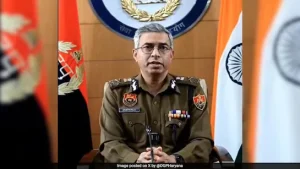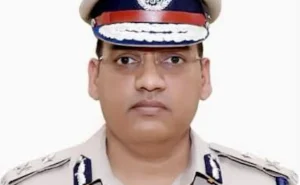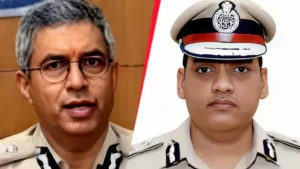Haryana – The Haryana IPS suicide case has taken a dramatic turn with the state government sending DGP Shatrujeet Kapur on leave amid mounting pressure from opposition parties and the deceased officer’s family demanding action against officials accused of harassment. The development represents a significant escalation in a case that has shocked the police establishment and raised serious questions about caste-based discrimination within law enforcement.
Late-Night Government Decision

The Haryana government’s decision to send the State DGP on leave in the Haryana IPS suicide case came late at night, days after authorities had transferred Narendra Bijarniya, the then Superintendent of Police of Rohtak. “Yes, the DGP has been sent on leave by the government,” confirmed Rajiv Jaitly, media adviser to the Haryana Chief Minister.
The move signals the government’s recognition of the gravity of allegations in the Haryana IPS suicide case and represents an attempt to address mounting criticism from opposition parties and civil society demanding accountability for the deceased officer’s death.
The Tragic Incident


Fifty-two-year-old Y Puran Kumar, a 2001-batch IPS officer, allegedly shot himself dead on October 7, triggering a political firestorm in Haryana. The circumstances surrounding the Haryana IPS suicide case have drawn national attention, particularly due to the serious allegations contained in the officer’s final note.
Kumar’s death has raised troubling questions about workplace harassment and discrimination within the Indian Police Service, an institution entrusted with upholding law and order across the country.
Eight-Page Final Note Reveals Serious Allegations
In an eight-page “final note” purportedly left behind, Kumar made grave accusations that lie at the heart of the Haryana IPS suicide case. He accused eight senior IPS officers, including DGP Kapur and Bijarniya, of “blatant caste-based discrimination, targeted mental harassment, public humiliation and atrocities.”
Also Read: Shocking Jain Temple Kalash Theft: Recovery After Delhi Police Investigation
These allegations in the Haryana IPS suicide case have sparked intense debate about systemic caste discrimination within police ranks and the psychological toll such harassment takes on officers. The detailed nature of Kumar’s note suggests prolonged suffering and repeated attempts to address grievances that went unheard.
Family’s Demands for Justice
The deceased officer’s wife, senior IAS officer Amneet P Kumar, has been vocal in demanding action in the Haryana IPS suicide case. She has specifically demanded that DGP Kapur and Bijarniya be named in the FIR for allegedly abetting her husband’s suicide.
The family’s stance in the Haryana IPS suicide case has been uncompromising—they have refused to give consent for post-mortem and cremation until their demands are addressed. This decision underscores the family’s determination to ensure accountability and justice for Kumar’s death.
The family is also seeking the arrest of the officers named in Kumar’s final note, viewing this as essential for ensuring a fair investigation into the Haryana IPS suicide case.
Special Investigation Team Formed


Following registration of an FIR in the Haryana IPS suicide case, Chandigarh Police constituted a six-member special investigation team to probe the matter. The formation of this specialized team indicates authorities’ recognition of the case’s complexity and the need for thorough, professional investigation.
The SIT’s work in the Haryana IPS suicide case will be closely watched by both the police establishment and civil society, with expectations high for a transparent and impartial probe into the allegations of harassment and discrimination.
Political Leaders Rally Behind Family
During recent days, numerous political leaders have visited Kumar’s family in Chandigarh to offer condolences, turning the Haryana IPS suicide case into a major political issue. Congress leader Rahul Gandhi is scheduled to meet the officer’s family on Tuesday, highlighting the national political attention the case has attracted.
Union Minister Ramdas Athawale, who met the family on Monday, stated that Haryana Chief Minister Nayab Singh Saini has assured action will be taken against those found guilty in the Haryana IPS suicide case. This assurance represents the government’s acknowledgment of the seriousness of the allegations.
Opposition Intensifies Pressure
Opposition parties have stepped up attacks on the government over the Haryana IPS suicide case, demanding immediate action. Several prominent opposition leaders visited the Kumar family’s Sector 24 residence in Chandigarh on Monday.
Telangana Deputy Chief Minister Mallu Bhatti Vikramarka, Congress MP from Rohtak Deepender Singh Hooda, INLD chief Abhay Singh Chautala, and Punjab Finance Minister Harpal Singh Cheema were among those expressing solidarity with the family in the Haryana IPS suicide case.
Demands for Immediate Action
Vikramarka, speaking about the Haryana IPS suicide case, described the alleged suicide as “extremely sad” and demanded immediate government action against officers named in Kumar’s “dying declaration.”
“Y Puran Kumar gave up his life and in his dying declaration, he mentioned particularly about two officers, Haryana DGP Shatrujeet Kapur and the then Rohtak SP Narendra (Bijarniya), stating that they have humiliated him, insulted him, and they are the root cause for his suicide,” he stated.
The Congress leader emphasized that the government must immediately act upon Kumar’s “dying declaration” in the Haryana IPS suicide case and take action against the officers responsible.
48-Hour Ultimatum Issued
A 31-member committee formed to seek justice for the deceased officer’s family issued a 48-hour ultimatum on Sunday demanding action against Kapur and Bijarniya in the Haryana IPS suicide case. This ultimatum reflects the growing impatience among those seeking accountability.
Broader Implications
The Haryana IPS suicide case has exposed serious issues within India’s premier police service, including alleged caste-based discrimination, workplace harassment, and the challenges faced by officers seeking redress for grievances. As investigations proceed, the case is likely to prompt discussions about systemic reforms needed to prevent similar tragedies and ensure dignity and respect for all officers regardless of caste or background.

